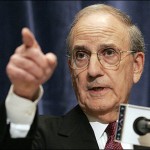Tuesday
Feb242009
Treading Softly on Iran: Dennis Ross Sneaks into the Administration
 Tuesday, February 24, 2009 at 7:38
Tuesday, February 24, 2009 at 7:38  Al Jazeera English reports the US State Department announcement that "Dennis Ross, a foreign policy veteran, has been appointed special adviser to Hillary Clinton, the US secretary of state, on the Gulf region", which includes Iran, the "broader Middle East", and southwest Asia. The appointment ends a saga running for weeks: it was widely expected that Ross would be appointed as an envoy, probably on the specific case of Iran, at the same time as Richard Holbrooke (Afghanistan/Pakistan) and George Mitchell (Middle East).
Al Jazeera English reports the US State Department announcement that "Dennis Ross, a foreign policy veteran, has been appointed special adviser to Hillary Clinton, the US secretary of state, on the Gulf region", which includes Iran, the "broader Middle East", and southwest Asia. The appointment ends a saga running for weeks: it was widely expected that Ross would be appointed as an envoy, probably on the specific case of Iran, at the same time as Richard Holbrooke (Afghanistan/Pakistan) and George Mitchell (Middle East).Yesterday, however, there wasn't much of a fuss. President Obama and Secretary of State Hillary Clinton were not on hand, as they were for Holbrooke and Clinton; instead, State Department Robert Gibbs made a perfunctory statement. So this morning, there is no headline coverage, and it is a Middle Eastern network, rather than an American media outlet, that has to bring us the news.
The reason? A no-brainer, really. If the Obama Administration wanted meaningful engagement with Iran, Ross couldn't be appointed as the point man, given his involvement with the Washington Institute for Near East Policy (WINEP), which has advocated co-ordination with Israel on diplomatic, economic, and then possibly military steps to deal with Tehran. So as the President's Inaugural challenge to shake the unclenched fist was met by some signals from Iran, Ross was put into storage.
He has been brought out now, but with a remit so broad that it threatens to be vague. Now he is not focused on Iran but overlapping with both Holbrooke and Mitchell. There may be some State Department master-plan setting out how Ross, a forceful personality, will work with those two envoys, equally forceful personality, and how he and his staff will in turn work with permanent State Department desks overseeing the Middle Eastern, Persian Gulf, and Southwest Asian regions.
Somehow I doubt it. Which isn't necessarily a bad thing, provided he stands in the corner as the processes which are already unfolding --- diplomatic manoeuvres and possibly discussions with Iran, a possible US acceptance of an Israel-Palestine process that includes all parties, and a review which (smaller hope here) might come to some sensible conclusions to limit the American march to trouble in Afghanistan/Pakistan --- continue unhindered.






